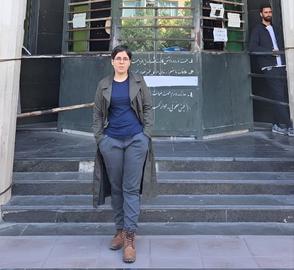Armita Pavir, a 29-year-old Iranian activist imprisoned in the northwestern city of Tabriz, says she has been on a hunger strike for 10 days, and holds the Islamic Republic accountable for any harm that may befall her.
In an audio file received by IranWire, Pavir says launched her hunger strike on November 12, the second since her arrest on September 13, emphasizing that her dreams, life and career have all been taken from her.
Speaking with a weak voice, she is interrupted every few minutes by a message saying, "This call is from Tabriz prison."
The activist says she will not relent, declaring that she cannot ignore the countless grieving families and the blood spilled in the authorities’ crackdown on dissent.
Recent reports emerged from Tabriz prison indicating that Pavir was hospitalized due to her deteriorating health.
The young woman was first detained during protests in Tabriz on October 31 last year. Before that, she was suspended and then banned from university for her student activism.
Pavir ran a Telegram channel where he shared her daily experiences and emphasized the need to keep up the resistance against the Islamic Republic to bring changes in her country.
Security agents have retained her mobile phone and electronic devices and pressured her to sign a letter of apology to justify her arrest.
The judiciary claims to have arrested her for "financial" reasons, citing a debt she allegedly owed the university for running a café at Tabriz Madani University.
However, an informed source has told IranWire that this is merely a pretext, as she remains incarcerated despite having paid the debt and damages.
In the audio file, Pavir confirms that the financial accusations are fabricated and describes being pressured to sign a "letter of repentance" since the first day of her detention.
According to Pavir, the city’s prosecutor forced her into a meeting in Tabriz prison.
"They told me to write a letter of repentance and express regret... but I explicitly stated that I’m not sorry or regretful, and if given the chance again, I would take the same actions," she says.
"Our discussion continued, and the prosecutor bluntly declared that anyone who opposes this system [the Islamic Republic] is a traitor,” she adds. “He was so enraged and narrow-minded that he shouted in the hallway that ‘no one has the right to assist this woman.’"
In response, she shouted that “no one desires assistance from you or your kind."
Pavir details the harassment she has faced since her arrest, stating that "from the moment I arrived, various officials spoke to me repeatedly to persuade me to write a letter of repentance."
She explains that her refusal to sign the letter and her interaction with the prosecutor led to the extension of her detention.
While similar cases typically take 10 to 15 days to reach court, this process took three months in Pavir’s case. During this time, a judge ruled she should remain incarcerated.
Pavir explains that after observing her positive interactions with other inmates, prison officials transferred her to a cell on a separate floor reserved for minors.
However, she says the cell also houses a woman accused of murder and another who faces the death penalty for drug trafficking.
"If I am a financial prisoner, why am I not in a financial ward [of the prison]?" she asks.
Pavir said she first went on a hunger strike to protest her transfer to a cell outside the general and financial crimes ward and the relentless pressure she endured.
"They didn't allow me to shop on my own,” she says. “I had to write a list and have other people buy things for me. As time went on, they increased the psychological pressure. The prison warden confiscated my notebook for no reason, even though I was using it to learn handicraft skills. When I walk in the yard, people constantly follow me around, eavesdropping on my conversations with others."
"This system, despite its arsenal of weapons, media outlets and despite its use of punishments, threats, and all forms of repression, feels so weak that it fears a women activist like me," she continued. "If I talk to a fellow prisoner for five minutes, the prison's order is disrupted."
Pavir reveals that she ended her first hunger strike after receiving promises from prison authorities that she would be transferred to the ward housing financial prisoners by November 10.
"They didn’t keep their promise, so I resumed my hunger strike and will not end it under any circumstances," she says.
"With each passing day, I become increasingly aware of my capacity for resilience and bravery."
"The end of this path is clear to me, not only for me but for all of us," according to the activist, who ends her audio message by saying: "Hope. Don't lose hope."

























comments